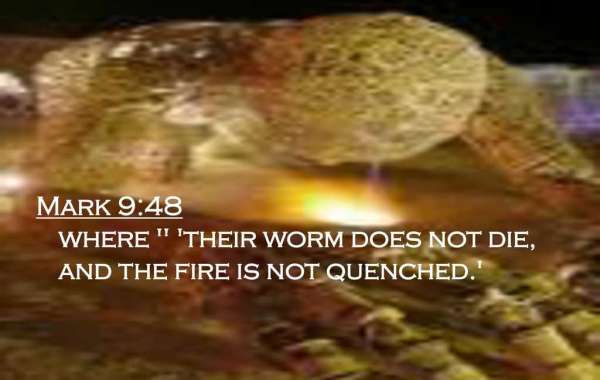Mark 9:48: … where their worm does not die and the fire is not quenched (cf. Job 25:6; Isa. 66:24; Acts 12:23).
At this point in Scripture, Jesus is focusing upon the eternal body and soul of the unrepentant sinner suffering in an everlasting hell (cf. Dan. 12:2; Matt. 10:28), or the "second death" (Rev 2:11; 20:14; 21:8), or their "eternal destruction" (2 Thess 1:9). There is the mention of "worm" (Greek, skolex) which means "a gnawing worm," and this will take us into a discussion of the decomposition of the body at death. In others words, Jesus uses what happens in the natural world concerning the decomposition of the human body to illustrate what happens in an eternal hell.
Note, what follows is pretty gross and not for young children or the faint of heart.
As a former homicide detective, I have had the displeasure of seeing numerous corpses, some at a stage that included many "worms" or what we commonly refer to as "maggots." Understanding insect activity (etymology) is important because it can help establish the time of death. There are five basic stages of decomposition: 1) fresh, 2) putrefaction, 3) fermentation, 4) dry decay, and finally 5) skeletonization. Every stage attracts different kinds of organisms that will feed off the cadaver (body). These stages may take days or in certain conditions even thousands of years. Yes, you read correctly – even thousands of years.
Decomposition begins several minutes after death. As it progresses, cadavers begin giving off a very foul, unmistakable odor, and believe me, once one has smelled it they will never forget it. Though other species of flies, beetles, and arthropods are attracted to cadavers, blowflies are among the most common. Adult female blowflies will often arrive minutes after death. They can be attracted to blood from as far as a mile away. They lay hundreds of eggs in orifices and other open wounds of the cadaver that begin to hatch within 24 hours. This gives rise to the first stage (instar) of maggots. As these maggots feed on the rotting cadaver, they molt to become even larger maggots (second instar), which feed for several hours before molting again (third instar).
Depending on temperature (heat speeds things up), moisture, location and other conditions, on approximately day three the maggots begin to move around a little – active not-dead worms! Finally, the maggots reach the pupa stage and wrap themselves in their little cocoons. At approximately 14 days the now adult blowflies leave; they just fly away.
Okay, then. How is this all relevant? Let's now consider what Jesus said in Mark 9:48 within the context of how decomposition works this side of eternity. As always, God is making an important point. Hell is the location of the living dead (rich man in Luke 16:22-24, 27-28). In regular decomposition, the worms (maggots) develop early at death. Mark 9:48 reveals that one's eternal decomposition never gets past this early stage of eternal worm activity. In other words, the eternal body never reaches the final stage of decomposition, which is skeletonization, There is no flying away. There is no escape. There is only an eternal imperishable body that is eternally perishing. Simply put, the unrepentant sinner's torment is forever.
Some Annihilationists will say that the bodies of the wicked cease to exist shortly after they reach hell. However, that is not true. Why?
- In the imagery of Mark 9:48, the maggots never become adults and fly away, symbolizing that decomposition is eternal. So, because the wicked never reach skeletonization, their payment for sin remains forever incomplete.
- The wicked don't lose their sin nature upon entering hell, so they continue to sin, therefore the punishment must be perpetual [1], and
- God is due eternal glory in his judgment (Rom 9:22-23; cf. Rev 18:20; 19:2-3), therefore it will never cease.
- Jesus adds, "and the fire is not quenched" (Mark 9:48). In other words, an eternal fire for eternal imperishable bodies never goes out. And if there are no bodies, there wouldn't be the for the torment described by the word "fire."
There is eternal fire in hell, however it is not the type of fire that totally consumes the imperishable body out of existence (Dan. 12:2; Matt. 25:46; cf. 1 Cor. 15:40, 42). We remember that the burning bush was not consumed (Exod 3:2). And Shadrach, Meshach, and Abednego survived unscathed by the fiery furnace (Dan 6:8-30). If God can do this — and he most certainly did — then he can prepare bodies that will never go out of existence because of an eternal fire! However, unlike Shadrach, Meshach, and Abednego, unrepentant sinners won't be unscathed. Because of their sins, they will suffer forever.
Hell is eternal! It is a scary place. As Jesus stated:
Matthew 10:28 And do not fear those who kill the body but cannot kill the soul. Rather fear him who can destroy both soul and body in hell (cf. Jude 1:23).
In light of this, why would anyone want to fall into the hands of an angry God? Why would anyone not want to be in God’s loving hands? (John 10:28; Rom. 5:8).
Footnote
[1] The "gnashing of teeth" in hell (Matt 8:12; 13:42; 22:13; 24:51; 25:30) while possibly referring to pain and suffering, definitely represents anger and seething hatred (Job 16:9; Psa 35:16; 37:12; 112:10; Lam 2:16; Mark 9:18; Acts 7:54-55). Since wicked anger and hatred are sins, then there is perpetual sin in hell requiring perpetual punishment.








